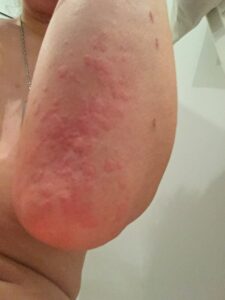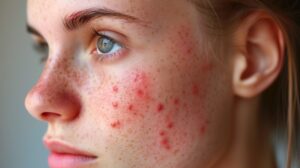Common Skin Conditions: Symptoms, Causes, and Treatments
The skin, the largest organ of the human body, is prone to a variety of issues that can affect its health and appearance. Understanding common skin conditions is essential in recognizing their symptoms, understanding their causes, and exploring the available treatments.
Skin Conditions Overview

“20180908 2210 – Claire’s FFS – 11 – day 5 – Claire’s rash – 55102250” by Claire CJS is licensed under CC BY-NC-SA 2.0
Introduction to Common Skin Conditions: Skin conditions encompass a wide range of issues that can affect the skin’s health and appearance. From common skin conditions like rashes and acne to more severe issues such as psoriasis and eczema, these ailments can vary in severity and symptoms.
Understanding Skin Diseases and Conditions: Skin diseases and conditions can manifest in different ways, including redness, inflammation, itchiness, and the formation of blisters or hives. Some conditions may be chronic, while others may be acute and resolve with treatment.
Exploring Skin Problems and Disorders: Skin problems and disorders can impact individuals of all ages and backgrounds. Whether it’s a fungal skin infection, a chronic skin condition like atopic dermatitis, or a type of skin cancer, these issues can have a significant impact on one’s quality of life if left untreated.
Rashes and Infections
Common skin conditions like rashes and infections can cause discomfort and affect the appearance of the skin. Understanding the causes and symptoms of these issues is crucial for effective management and treatment.
Causes and Symptoms of Skin Rashes
Skin rashes can be triggered by various factors such as allergies, infections, or skin irritants. Symptoms may include redness, itchiness, and the formation of blisters or hives. Identifying the underlying cause of the rash is important for implementing the appropriate treatment approach, which may involve topical creams or medications.
Treating Skin Infections
Skin infections can result from bacteria, fungi, or viruses entering the skin through cuts or other openings. Proper treatment typically involves medications such as antibiotics or antifungal creams to clear the infection. In severe cases, oral medications may be necessary. It’s essential to seek medical advice if an infection does not improve with at-home remedies.
Hives: Symptoms and Treatments
Hives are characterized by raised, red welts on the skin that are usually itchy and can vary in size. Common triggers include allergens, stress, or infections. Treatment options for hives may include antihistamines to relieve itching and inflammation. Identifying and avoiding triggers can help prevent recurrent episodes of hives.
Skin Disorders

Rosacea | Skin Care
Skin disorders encompass a wide range of issues that can impact the health and appearance of the skin. Understanding these conditions is crucial for proper management and treatment. From common problems like eczema and acne to more complex issues like rosacea, each condition presents its unique challenges.
Overview of Eczema and Treatment Approaches
Eczema, also known as atopic dermatitis, is a chronic skin condition characterized by red, itchy patches of skin. Treatment often involves moisturizing the skin, avoiding triggers, and using topical corticosteroids to reduce inflammation. In severe cases, phototherapy or oral medications may be recommended by a Dermatologist.
Acne: Causes and Management
Acne is a common skin condition that occurs when hair follicles become clogged with oil and dead skin cells. Factors like hormonal changes, genetics, and bacteria contribute to acne development. Management strategies include topical treatments, oral medications, and lifestyle changes to reduce breakouts.
Rosacea: Symptoms and Care
Rosacea is a chronic inflammatory skin condition that primarily affects the face, causing redness, swelling, and sometimes pimples. Triggers such as sun exposure, spicy foods, and stress can worsen symptoms. Treatment may involve topical creams, oral antibiotics, and lifestyle modifications to manage flare-ups.
Skin Cancers and Other Conditions

Skin cancers and other conditions pose significant health risks and require prompt attention for proper diagnosis and treatment. Understanding the types of skin cancer, prevention tips, and approaches to managing various skin conditions is essential for maintaining skin health.
Types of Skin Cancer and Prevention Tips
There are several types of skin cancer, including basal cell carcinoma, squamous cell carcinoma, and melanoma. Prevention strategies such as using sunscreen, avoiding prolonged sun exposure, and regular skin checks are crucial in reducing the risk of developing skin cancer.
Atopic Dermatitis: Symptoms and Treatments
Atopic dermatitis, a common form of eczema, is characterized by dry, itchy skin that can flare up periodically. Treatment involves moisturizing the skin, using topical steroids, and identifying triggers to manage symptoms effectively. Consulting a Dermatologist for personalized care is advisable for severe cases.
Common Causes of Skin Conditions
Various factors can contribute to the development of skin conditions, including genetics, environmental triggers, allergies, and immune system dysfunction. Understanding the underlying causes of skin issues is essential in implementing targeted treatments that address the root of the problem, leading to better outcomes for the skin’s health.
Frequently Asked Questions about Skin Conditions
1. What are common types of skin conditions?
Skin conditions encompass a wide range of issues that affect the skin. Some common ones include rashes, eczema, acne, psoriasis, rosacea, and skin infections.
2. Is skin cancer a common concern?
Skin cancer is a serious condition that can develop from prolonged sun exposure or genetic factors. Regular skin checks and sun protection are crucial for early detection and prevention.
3. How to identify and treat a rash on the skin?
A rash is a noticeable change in the texture or color of the skin. It can be triggered by various factors such as allergies or infections. Treatment usually involves creams or medications prescribed by a licensed Esthetician.
4. What are the causes of common skin issues?
Common skin problems like itchiness, redness, and inflammation can be caused by environmental factors, genetics, allergies, or underlying health conditions. Proper diagnosis is essential for effective treatment.
5. How do you differentiate between skin diseases and skin disorders?
Skin diseases refer to medical conditions that affect the skin’s structure or function, such as psoriasis or eczema. Skin disorders are more general and can include issues like acne or skin infections.
6. What is the best approach for managing skin infections?
Skin infections can be caused by bacteria, fungi, or viruses and may require topical or oral medications for treatment. Keeping the affected area clean and dry is essential to prevent further complications.
7. How can eczema and acne be effectively treated?
Eczema and acne can be effectively treated in several ways:
1. For eczema:
– Use gentle cleansers and moisturizers specifically formulated for eczema-prone skin.
– Avoid harsh soaps and detergents that can aggravate eczema.
– Use topical corticosteroids or other anti-inflammatory creams prescribed by a Dermatologist to reduce inflammation.
– Take oral antihistamines to alleviate itching.
– Try phototherapy (light therapy) under the guidance of a licensed Esthetician.
2. For acne:
– Keep skin clean by washing the affected areas with a gentle cleanser.
– Use over-the-counter acne products containing salicylic acid, benzoyl peroxide, or sulfur to help treat and prevent breakouts.
– Use topical retinoids to unclog pores and prevent new acne lesions.
– Take oral medications such as antibiotics or oral contraceptives to address underlying causes of acne.
– Consider professional treatments like chemical peels, laser therapy, or extraction of comedones by a licensed Esthetician.
It is important to consult with a healthcare professional or licensed Esthetician before starting any treatment regimen, as they can provide personalized recommendations based on the severity and type of eczema or acne.

